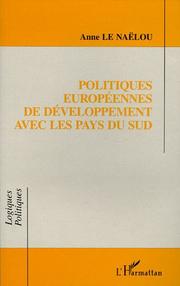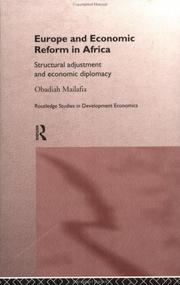| Listing 1 - 10 of 200 | << page >> |
Sort by
|

ISBN: 2706813504 Year: 1999 Publisher: Paris : Maisonneuve,
Abstract | Keywords | Export | Availability | Bookmark
 Loading...
Loading...Choose an application
- Reference Manager
- EndNote
- RefWorks (Direct export to RefWorks)
Book
ISBN: 2738454569 9782738454560 Year: 1997 Publisher: Paris: L'Harmattan,
Abstract | Keywords | Export | Availability | Bookmark
 Loading...
Loading...Choose an application
- Reference Manager
- EndNote
- RefWorks (Direct export to RefWorks)
Book
ISBN: 9781856286787 1856286789 Year: 1994 Publisher: Aldershot: Avebury,
Abstract | Keywords | Export | Availability | Bookmark
 Loading...
Loading...Choose an application
- Reference Manager
- EndNote
- RefWorks (Direct export to RefWorks)

ISBN: 2738433316 9782738433312 Year: 1995 Volume: 27 Publisher: Paris : L'Harmattan,
Abstract | Keywords | Export | Availability | Bookmark
 Loading...
Loading...Choose an application
- Reference Manager
- EndNote
- RefWorks (Direct export to RefWorks)
A partir d'enquêtes réalisées en Bolivie auprès d'acteurs mettant en oeuvre des projets de développement rural financés par l'Europe, l'auteur propose une réflexion sur la politique communautaire de développement.
Book
ISBN: 9264019650 Year: 2007 Publisher: Paris : OECD,
Abstract | Keywords | Export | Availability | Bookmark
 Loading...
Loading...Choose an application
- Reference Manager
- EndNote
- RefWorks (Direct export to RefWorks)
Book
Year: 2005 Publisher: [Washington, D.C. : World Bank,
Abstract | Keywords | Export | Availability | Bookmark
 Loading...
Loading...Choose an application
- Reference Manager
- EndNote
- RefWorks (Direct export to RefWorks)
"This paper considers approaches towards improving the predictability of aid to low income countries, with a special focus on budget support. In order to accelerate progress towards the Millennium Development Goals, the donor community is increasing aid flows while pushing for more coordination and tighter performance-based selectivity. However, these factors may increase the unpredictability of aid from current levels, which are already high enough to impose significant costs. Predictability is a particular challenge in the area of budget support, which will continue to increase in importance as aid is sought to underpin longer-term recurrent spending commitments. Budget support reduces transactions costs and drains on capacity, but it tends to be more vulnerable to fluctuations than multi-year project support. Poor predictability raises the threat of a low-level equilibrium: countries, budgeting prudently within a medium-term fiscal framework, will discount commitments; donors will see few funding gaps, so pledges will fall. With some countries discounting aid commitments in formulating budgets, some already see signs of this happening. To improve predictability, donors must extend their funding horizons. However, even if this can be done, several major issues will remain at country level. First, how can countries deal with residual short-run volatility of disbursements relative to commitments? Second, can donors lengthen commitment horizons to individual developing countries without excessive risk of misallocating aid? Third, within a country's overall aid envelope, how should donors set the shares of project aid and budget support? Finally, the paper considers the other main approach to budget support, the output or outcome-driven approach of the European Union. The paper concludes that many of these issues can be addressed. Simple spending and savings rules built around a buffer reserve fund of 2-4 months of imports can help smooth public spending. Aid can be pre-committed several years ahead with only small efficiency losses, using a strategy of "flexible pre-commitment." Guidelines can be set to limit the volatility of budget support while keeping it performance-based, and past experience can be used more systematically to develop "outcome" norms to better guide aid allocation. "--World Bank web site.
Book
Year: 2005 Publisher: [Washington, D.C. : World Bank,
Abstract | Keywords | Export | Availability | Bookmark
 Loading...
Loading...Choose an application
- Reference Manager
- EndNote
- RefWorks (Direct export to RefWorks)
"This paper considers approaches towards improving the predictability of aid to low income countries, with a special focus on budget support. In order to accelerate progress towards the Millennium Development Goals, the donor community is increasing aid flows while pushing for more coordination and tighter performance-based selectivity. However, these factors may increase the unpredictability of aid from current levels, which are already high enough to impose significant costs. Predictability is a particular challenge in the area of budget support, which will continue to increase in importance as aid is sought to underpin longer-term recurrent spending commitments. Budget support reduces transactions costs and drains on capacity, but it tends to be more vulnerable to fluctuations than multi-year project support. Poor predictability raises the threat of a low-level equilibrium: countries, budgeting prudently within a medium-term fiscal framework, will discount commitments; donors will see few funding gaps, so pledges will fall. With some countries discounting aid commitments in formulating budgets, some already see signs of this happening. To improve predictability, donors must extend their funding horizons. However, even if this can be done, several major issues will remain at country level. First, how can countries deal with residual short-run volatility of disbursements relative to commitments? Second, can donors lengthen commitment horizons to individual developing countries without excessive risk of misallocating aid? Third, within a country's overall aid envelope, how should donors set the shares of project aid and budget support? Finally, the paper considers the other main approach to budget support, the output or outcome-driven approach of the European Union. The paper concludes that many of these issues can be addressed. Simple spending and savings rules built around a buffer reserve fund of 2-4 months of imports can help smooth public spending. Aid can be pre-committed several years ahead with only small efficiency losses, using a strategy of "flexible pre-commitment." Guidelines can be set to limit the volatility of budget support while keeping it performance-based, and past experience can be used more systematically to develop "outcome" norms to better guide aid allocation. "--World Bank web site.
Book
ISBN: 9780719062995 Year: 2009 Publisher: Manchester Manchester university press
Abstract | Keywords | Export | Availability | Bookmark
 Loading...
Loading...Choose an application
- Reference Manager
- EndNote
- RefWorks (Direct export to RefWorks)
Book
ISBN: 103248733X 9781032487359 9781032487335 1032487356 Year: 2024 Publisher: London: Routledge,
Abstract | Keywords | Export | Availability | Bookmark
 Loading...
Loading...Choose an application
- Reference Manager
- EndNote
- RefWorks (Direct export to RefWorks)
"Drawing on a range of expert contributions, this book explores how the European Green Deal is being deployed in practice and observes how the EU tries to promote the protection of the environment in third countries. The book begins by assessing the state-of-the art in terms of the key conceptual issues and analyses sectoral initiatives that are particularly relevant for the deployment of the European Green Deal external dimensions. These include the Carbon Border Adjustment Mechanism, the EU's regulatory action in the control of maritime emissions, the 2030 Biodiversity Strategy, the Deforestation Initiative, the Zero Pollution Initiative, the From Farm to Fork Initiative, and the Climate Neutrality and Clean Energy Initiative in the context of the Energy Charter Treaty. Next, the authors deal with horizontal aspects of the European Green Deal that also have external dimensions, such as the Green Deal Diplomacy, the Green Public Procurement, funding measures, initiatives related to corporate sustainability and due diligence, and the implementation and enforcement of EU environmental law. The volume concludes with a cross-cutting analysis, focusing on how the EU can strengthen the impact of its normative power on international environmental governance, while also noting its limitations. Deploying the European Green Deal will be of great interest to students and scholars of international and EU environmental law and environmental policy and governance"--

ISBN: 9780415148252 0415148251 Year: 1997 Publisher: London: Routledge,
Abstract | Keywords | Export | Availability | Bookmark
 Loading...
Loading...Choose an application
- Reference Manager
- EndNote
- RefWorks (Direct export to RefWorks)
| Listing 1 - 10 of 200 | << page >> |
Sort by
|

 Search
Search Feedback
Feedback About UniCat
About UniCat  Help
Help News
News